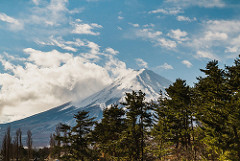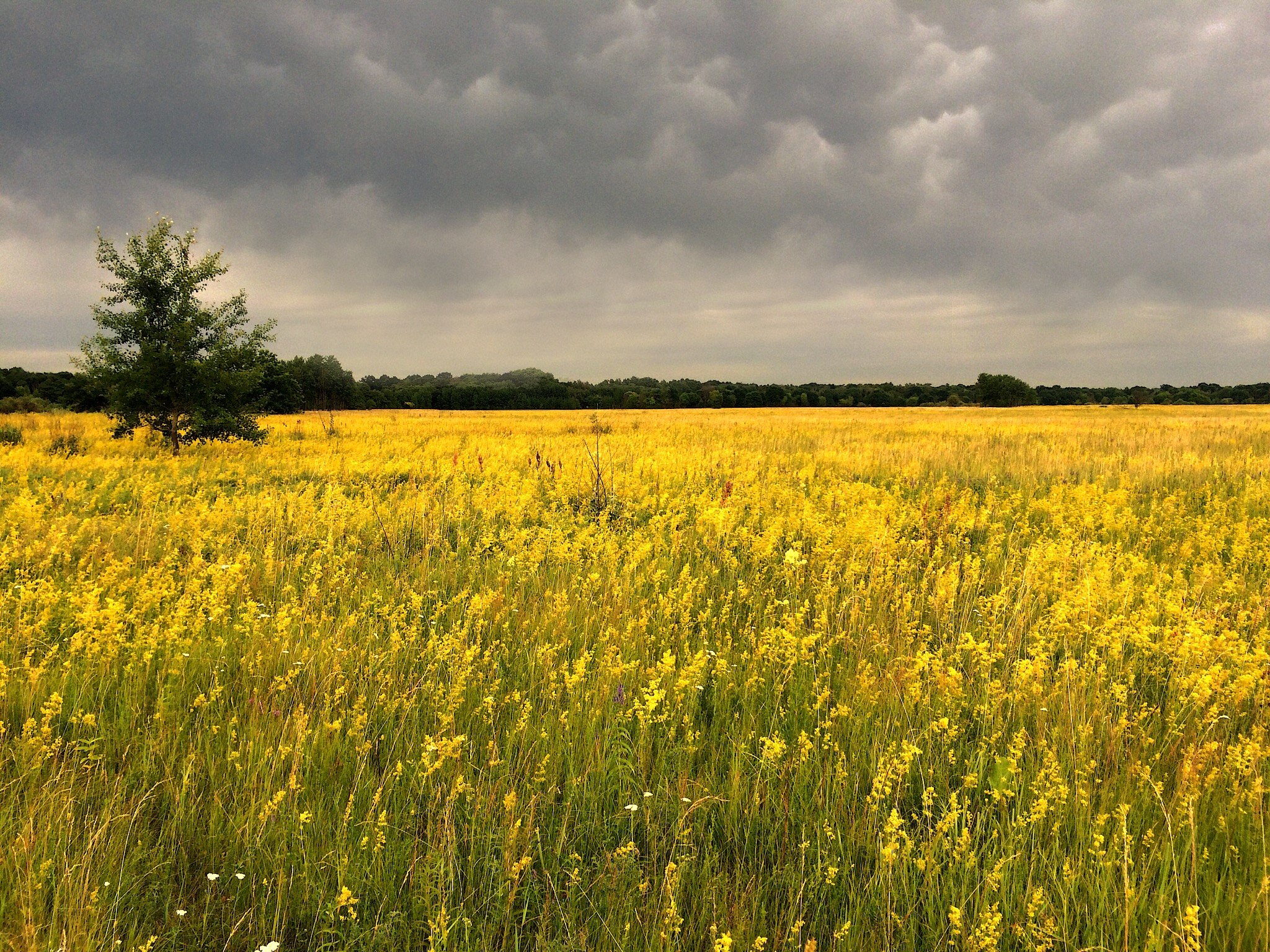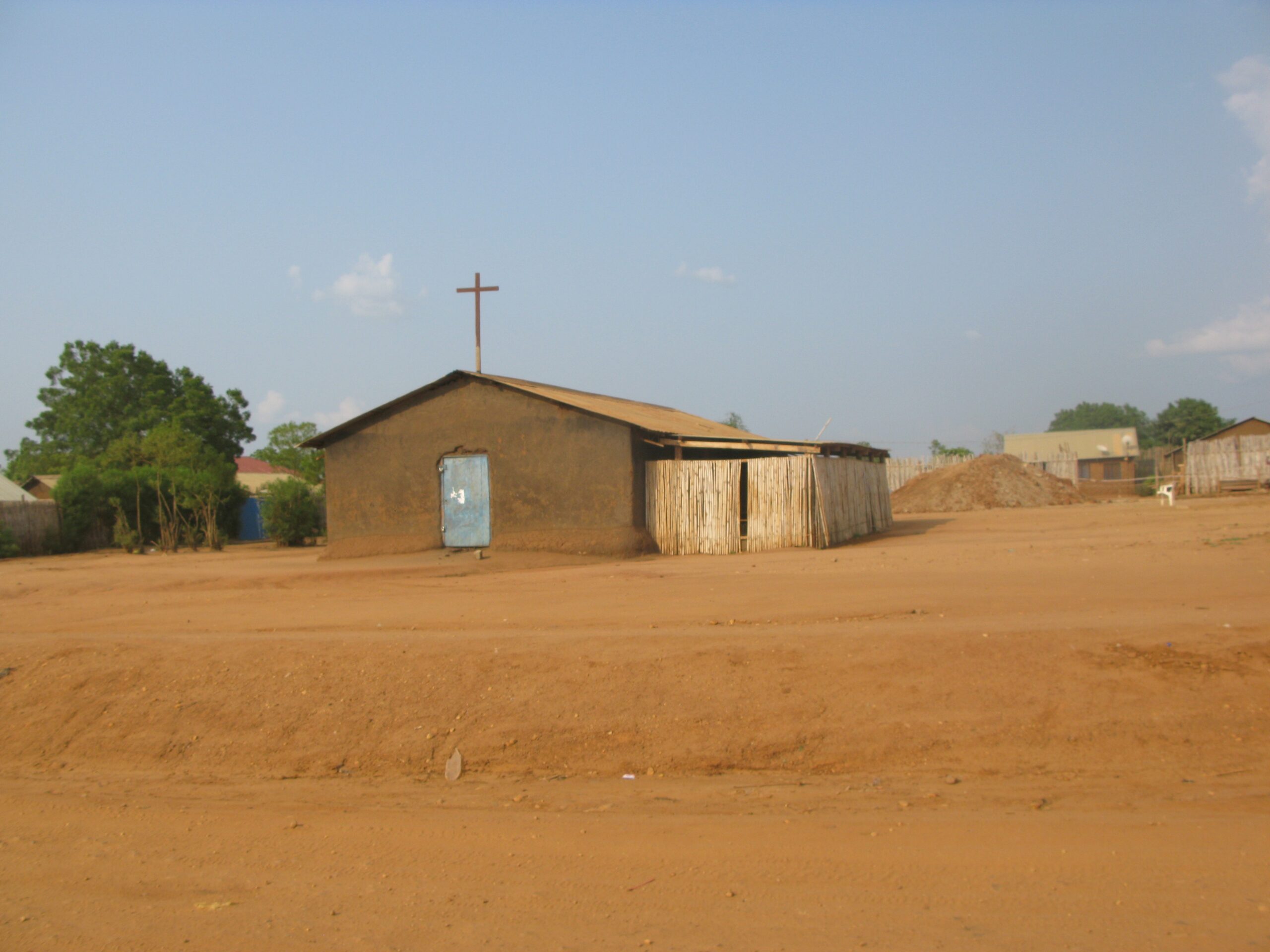Dr. Nakajima had a poem in his head. It went something like, however far I go, blue mountains.
‘Ah,’ the Doctor thought, ‘I like the style of Taneda Santka. He is modern, yes, but his poems are easy enough to remember in volume. They are neat and simple and great for these summer days when the mountains grow taller on the horizon with every step. What a joy life is, when someone else puts words around it.’
A cloud passed over the sun, turning the blue surfaces of the flooded rice fields grey. It was then that he noticed the man standing on the opposite bank of the field. The Doctor thought his mind was playing tricks on him, for the landscape had been empty all afternoon, and especially so in that moment it took him to remember the Santka poem, that moment when the landscape stilled and gave up to him a voice from his past. The other man was shortish, bald, and wore round spectacles that flashed in the sun and a black cotton kimono. If it were not for the obvious difference in their ages, the Doctor could have been looking at a vision of himself. But the man was old, weary. Although he stood perfectly still, his back was hunched. The Doctor never stooped. Indeed, he prided himself on his posture.
As the Doctor stared at the man, the man stared back, his black form and its reflection rising up from the dike, like kousa suru sen—intersecting lines.
The cloud passed; the fields were blue once more. Their brightness hurt Dr. Nakajima’s eyes. He lowered his gaze, blinking. The stillness of the figure on the dike unsettled him. Perhaps it was best to keep moving.
On reaching the road, which wound along the valley and deeper into the mountains, the Doctor started to doubt his own eyes. Had they played tricks on him?
He turned to swipe a second look at the man.
He was gone.
The Doctor turned his whole body around to scan the valley through which he had spent the last hour walking. Relief came when he caught sight of the outline of a man in a black kimono moving towards the mountains, the Doctor’s own destination, though he intended to meet them farther to the north, where they rose, steep and black, uninhabitable. He sighed, glad that the figure had not evaporated in the heat haze.
The man in the valley was holding something. It glinted in the sun—a bottle, a large sake bottle. The man raised it to his lips as if in salute to the Doctor’s keen observation.
The object in the Doctor’s own hands, which he had forgotten about so completely in his march towards the mountains, pulled at the earth, its weight suddenly multiplied tenfold. He dared not put it down, though. The white box was all he had saved from his house, burnt to the ground by American B-29s before lunch.
The sun lost its heat once again. The Doctor again looked to the sky, to the column of black smoke rising from the port in the distance. The box, a gift from the Emperor, filled with the ashes of the Doctor’s son, grew heavier still.
The Doctor stopped in the middle of the road, lost for directions. Should he continue towards the northern mountains, as he had set out to do? Or should he follow the black figure?
When he had left the port, its heavy docks and brickwork factories, the skeletal frames of cranes were black beams melting into a thatch of red flame. The air pulsed with the hum of engines, the whizz of the incendiaries lost to the roar of the fire, unless falling close by. The Doctor’s grand house stood on the edge of town. From its roof, he had watched the fires spread, watched the people fleeing to the south, their bundles of possessions, wrapped in furoshiki, discarded along the banks of the canal. They were all supposed to stay put. To form bucket chains. To fight back. The Doctor, too, was a chief member of the local Vigilance Corps. But they had learned from the fate of those other cities. ‘Do not wait,’ the spiritus mundi cried to him, to them all. ‘Do not wait.’
The mountains to the north were still misted over from the night. Santka had meditated upon such mountains when he wrote, what is more than death—mountains swathed in mists.
The Doctor, leaving behind his small practice and the fine twisted pine that slept in the garden, took his white box and crossed the canal.
‘Can a farmer whose land is overgrown still be called a farmer?’
This was the thought that occupied Dr. Nakajima as he followed the figure in black robes through a field overgrown with summer grasses. The land was markedly different to the rice fields of the previous day. That which had grown green over the ridgeline, blue when the broken cloud cover permitted, was yellow here. Had a season passed overnight? Was there only a day’s distance between the meadow and the port?
Because the war had drained the land of able bodies to till the soil, to make it yield, the air was now fragrant, scented by flowers and the tall grasses.The Doctor filled his lungs. He hoped to keep this air inside him always.
The man in front of him maintained a slow pace, and Dr. Nakajima had to slow down on descents, so as not to overtake him.
The Doctor had come to the conclusion the day before that the man didn’t mind him following. For every now and then, at an isolated village in the shadow of a mountain, the man would knock at the front door to a farmstead and wait to be received, his begging bowl in hand. The inhabitants, when they answered, were dreadfully thin, their eyes and mouths twisted by suspicion. Their reaction was quite understandable. Many rural communities had swollen to bursting with hungry refugees over the months; city folk, the women and old people left after losing their sons and husbands to the red drafting ticket, still came out to the plains south of the port to bargain for, and even steal, vegetables. The Doctor had purchased such produce on the black market himself, over the last few years. The man in black looked down into his bowl after stepping away from a house, standing by its gate as if waiting for the Doctor to follow suit. While he waited for the Doctor, he weighed his bowl with a dipping motion of his hand. The Doctor, aware of his hunger at such moments, would then go up to the same door and knock. Most of the time he received nothing at all, but occasionally some pickled cucumber, or some steamed mountain yam, would drop into his bowl. And, ah, how the aching green of the hills, the cicadas’ deafening whir, would lose its piercing intensity at those moments when some farmer took pity on the wandering stranger with a box in his hands and gave him a drink.
The Doctor could think of no other words to describe the taste of the alcohol he received, be it sake or shch: It tasted yellow. It tasted like spleen.
Dr. Nakajima sat naked in a hot spring. A thin lip of rock separated the pool from the vast expanse of the lake. Where the hot water spilled over and penetrated the cold, a band of burnt-amber crust stained the shoreline.What steam rose soon faded into the wet summer air.
‘Already three days,’ he thought, ‘and my joints ache from walking.’
Close by, where the heat and chemical mist of the spring could not reach, moss colonized a hillside. The Doctor was astonished that he had not seen so much green before—but then again, he had been quite overwhelmed by the sight of the pool and his good fortune at having found a place where he could bathe in comfort.
He looked for the man in the black robes, the priest he had followed to the pool. And there he came, out of the woods, walking along the lake’s stone edge towards the Doctor. Without modesty, the man unlooped himself from his pouches, which he wore like saddlebags, only at the wrong angle, for they covered his chest and back; unwound his gaiters; slipped off his jika-tabi, the footwear of carpenters; stripped off his robes and loincloth. The man’s ribs showed through his skin, and yet a ring of flesh hung from his middle. His hairy scrotum swung beneath him, low and heavy, as if he were not human at all, but a raccoon pretending to be human. The priest took a bottle of sake from one of his discarded pouches before gingerly stepping into the pool, muttering, “Ei, yei, yei,” at the heat.
Settling down into the water, he said, “You are lucky! I have never known the love of a woman. When I was young, I thought that a woman’s body was what I wanted. You may call me Shichi. That was the name my mother called me.”
He took a slog of the alcohol and put the bottle on the pool’s lip, next to the Doctor.
Face-to-face with him for the first time, the Doctor recognized the man as the very poet whom he had been contemplating since he started walking the day before. Taneda Santka was his pen name. He’d died over four years ago, filled with misgivings over the nation’s course to war, despite the fact that the Imperial troops were winning back then. The Doctor and his friends had admired the poet’s work since the early Thirties and had even sent money to the magazine Cuckoo to fund the itinerant poet’s unusual lifestyle.
The Doctor knew of Shichi’s family: how his mother had drowned herself in the family well when he was a boy; how he had pushed through the crowd of villagers to gaze upon the body dragged up with a hook; how his brother, still a young man, had hanged himself. Shichi had once thrown himself before a tram, only to be saved by an onlooker, who afterwards took him to a Zen temple for guidance.
“Are you familiar with the poetry of Wang Wei?” Shichi said. Without waiting for a response, he continued, “Don’t you find sitting here, in this place, that poems so easily come to mind? Wang Wei wrote a poem about moss.”
As the poet tried to remember the exact words, he sank down to his neck in hot water. “There was a lovely ambiguity about the poem’s final lines, I recall, due to the Chinese character Wei had chosen. Was the green light on or above or atop the moss?”
How lovely, the Doctor thought, to be able to have a choice and yet no choice at all. The light was both around and touching the moss; the moss was in his mind; the moss covered a hillside before him. Busy with patients and no supplies, the Doctor had stopped caring for poetry as the war had deepened like hunger. Such thoughts seemed frivolous, when telling a patient with tetanus that a shot of serum would cure their lockjaw, but there was no serum to give. They would have to go thirsty.
Dr. Nakajima felt the initial pangs of a headache coming on. The thought of the war caused the memory to burst, like a bubble rising from the earth, given shape by the water which surrounded it, until, popping out of the surface, it became nothing. A cloud, reflected in the centre of the lake, shuffled along in a dying series of expanding rings. A fish must have jumped from that spot, but the Doctor never saw it, the fish that stretched the moment into the realm of dreams.
A crack of summer thunder boomed at the far end of the lake. As if in reaction, little waves lapped at the shore, and the cicadas whirred more loudly. The Doctor wiped his brow, but instantly, from the humid air made hotter by the pool’s vapour, more sweat formed. He took a drink—the mountains took on a yellowish tint—he took another. Evening descended quickly, as a distant ridge cut and then devoured the sun.
“Mountain twilight,” the poet said. “See how the white paint of your box shines though all else falls into shadow? Something similar happens in winter, in a forest where snow covers the ground.”
The white box. Unwilling to put it on the ground, where he left his clothes, the Doctor had left it on top of a rock. In the gathering darkness it shone. He felt guilty for having not thought about it, and the son it contained, in part, for some time—an hour, two.
The two men sat in the silence of the lake, the hillsides, their forests, brooding. They passed the bottle between them until it was empty.
The wind picked up and obliterated the stink of sulphur. In its place, the air smelt green; the Doctor’s soul felt green, too.
The storm broke over them.
Rain pelted the lake, the pool’s water; cool rain, which felt good on the crown of the Doctor’s head, down his neck. The Doctor, drunk by now, imagined that the two of them must look like a couple of nihonzaru, their monkey faces wrinkled and red, hiding from the cold of a blizzard.
How could it be that grass seeds, which had stuck to the hem of his robes the previous morning, still clung to him? Rain had fallen all night, soaking him to the skin. Still, they had not washed away. As he walked up the path leading deeper into a wooded hillside, he flicked at them with his fingers. But they clung to the cotton more vehemently.
Shichi looked back over his shoulder and said, “Travelers do not wash away so easily.” His voice was hushed by the rattling of raindrops in the canopy above, the tapping of larger drops as they gathered on the higher leaves, until their weight brought them crashing down onto the fat leaves of the mountain bamboo below.
“Somehow, I keep living, summer grasses—isn’t that so?” the Doctor called up to the black figure. If Shichi had heard him, he chose to ignore his own words. Still, the Doctor had removed his glasses, and the noise of the rain, the intimacy of huddled tree trunks, kept the Doctor’s mood buoyant. Light, even.
Still musing on the irony of the seeds, he stopped at a mountain shrine to shelter from the rain. Shichi waited outside, the ceaseless downpour cascading from his huge woven hat onto the mud, like the eaves on a tiny, moveable house. The poet’s folded arms betrayed an impatience the Doctor had never inferred from his poetry. ‘You are already wet through,’ his countenance suggested. ‘Why stop?’
The Doctor did not want to soil the shrine’s narrow interior any further—the damp climate had already eaten away at its woodwork—and so he kept the door open and sat with his legs dangling down from the entrance. In spite of his geta, his feet were muddy, and he didn’t want to smear the shrine’s floor with the detritus of his wanderings.
No sooner had he put the white box behind him and released his grip on it than a young boy’s face came out of the gloom. For a moment, the Doctor thought it was his son’s spirit spilling out from its makeshift grave, and he smiled at the apparition.
The boy did not smile back.
The Doctor took in the embarrassed look on the youngster’s face, the air of submission oozing from his thin frame. ‘The boy must have been sleeping here,’ he thought.
The boy rose to leave. Before he jumped down into the sea of mud, with its hot fug of rotting vegetation, he took two gigantic mushrooms from a stack he had gathered in a wicker basket. He left them at the Doctor’s side; he believed that the Doctor and Shichi were mountain priests, come to shelter with the local gods.
Before the Doctor could gather his voice and thank him for his kindness, the boy stepped out into the rain and green light, which revealed to the Doctor how malnourished he was. The boy’s skin was burnt a dark brown and was the same colour as his hair—hair that must have once been black like coal. ‘Brown is the colour of hunger these days,’ the Doctor thought, remembering the homeless children he had seen dying at the port’s railway station, their skin hard and limbs gnarled, like the wood of a walking staff.
The Doctor walked out from the woods and found himself in a valley flooded with paddy fields. The hour was getting late. Was this the same valley that led from the port up into the mountains?
Shichi had already walked out onto one of the fields’ dikes. The Doctor watched the figure fade into a black blur, an ink stroke made with too much water in the brush.
The image of the mountain boy’s face came back to him, as it had all morning. The more the Doctor tried to push it from his mind, the more it tormented him by morphing into the visage of his own son, when still a toddler. It was the face of a living ghost and would not let him be. Such was the Doctor’s weakness of spirit, his exhaustion. It was a condition he had endured ever since becoming a father. Whenever a child was brought to him for help, huddled into its mother’s bosom, its eyes wide with fear, her eyes searching for reassurance, his professional distance faulted, and his sensitivities caused him to recall the face of his own son when he was still an infant.
The rain poured down, strafing the waters of the paddy fields. Strong winds herded low clouds into the valley. Thunderclaps broke over him, shattering his thoughts. But each time his visions pieced themselves together again, reforming into the visage of the boy, the face of his son.
Dr. Nakajima needed a drink. Shichi had not looked back at him since they left the shrine. If only he could get his attention. But Shichi was too far away now, and growing fainter. The rain would shoot his words—his voice—into the flooding fields.
To fill his empty stomach with something, anything that might reduce the gathering gnawing, the Doctor took a large bite from one of the boy’s mushrooms. He rolled the lump—and soon the crumbs—of the rubbery, brittle fungus around his mouth. The sensation gave him something to concentrate on. He swallowed and took another bite, forcing his right foot to lead, to get him onto the dike, into the valley.
Had his son died with an empty stomach?
On visiting the university hospital to ask for supplies, he had always been acutely aware of how few wounded there were; how his son was not amongst them; how many young men must have succumbed to their wounds in the field. All the patients were dreadfully thin. Their eyes betrayed their shame; many did not talk.
A good ways into the valley, open to the lashing rain, the worst of which the forest had protected him from until now, the Doctor approached Shichi. The priest had stopped in the middle of the dike. The quivering lip of the other man, his sunken eyes—eyes that sparkled when he was drunk—told the Doctor that the poet was in greater need of a drink than he was.
As if reading his mind, the poet spoke into the rain, staring straight ahead of him as he did so, “Sake is my koan, my riddle; if I could master sake, if I could understand how to drink it, that would be my awakening.” He took a glass from the satchel hanging on his chest. “To drown in it just won’t do.”
The poet lifted up the glass and filled it with rainwater, using his hat as a fount. Once it was half full, he drank the pure liquid, his eyes never leaving the steel-grey of the paddy fields. The Doctor became aware of how the fields, stretching out from and around the dike, took on a sense of benevolent magnitude.
Shichi refilled his glass in the same manner and offered it to the Doctor.
“So then, Doctor, do you have any Calmotin on you?” he asked and laughed.
“I’m sorry—I didn’t bring any sedatives with me.”
“No. Just your box.”
“Yes, that’s right. Just this box.”
The Doctor looked at the wooden cube he carried under his right arm. Though it glowed in the valley’s gloom, its brightness was dulled, reflecting some of the landscape’s grey, diffused light.
“Did you know I wrote many poems about white boxes such as the one you carry? The censors did not silence them all.”
The Doctor shook his head, although he did know. The plop-plopping of the rain on the whitewashed wood brought to mind a poem about the drops of sweat falling from a soldier’s nose onto such a package, on the morning of a repatriation parade.
Dying too late into the war, his son had not been greeted with marching soldiers and bugle calls. When he had received the box, the Doctor recalled, a lark had called out. Wasn’t it another poet, Natsume Sseki, who had written that the lark must sing the spring day to its close; sing it into light and darkness again, finding its death in the sky?
“Was it only four days ago I walked over that bridge?” the Doctor said to Shichi.
The port, the smoke of its fires now lifted, was an open black ash pit, the wooden houses of its residential areas gone, the concrete shells of the town hall and bank still standing, the sky showing through their windows like dead eyes. Of the docks, only the frames of the cranes remained.
What struck the Doctor was that he could see the seaward horizon, an impossible sight three days earlier, or a month, or a year, what with the houses that used to line the canal bank. The rains blown far out to sea overnight, a single cloud rested on that strip of distant blue, that line, a shade darker than the sky, resting on that layer of black. Ash, levelled by the vibrations of high explosives, swept smooth by the winds created by the inferno, spread all the way to the docks. Not a single house had survived the gasoline jelly and incendiary bombs. The single cloud on the horizon reminded the Doctor of the bubble in a spirit level. Absolutely flat.
Birds sang on the side of the canal where the Doctor and Shichi stood. The foothills, starting thereafter, were green; blue at distance; unbearable yellow light bounded up from the surface of the sludge-slicked canal. His route had taken him back to his starting point.
The Doctor’s throat was parched; his stomach ached.
“The sky should be an angrier colour,” he said, more to hear his own voice than to talk to Shichi.
After a pause, the poet replied, “When I returned to my family homestead, after a ten-year absence, all that remained were the fireflies.”
Jamie Edgecombe lives with his wife, Yuko, and their two children, Rintaro and Hinako, on the edge of Dartmoor National Park in southwest Devon, England. Having lived and taught in Hokkaido, Japan, he now teaches at Tavistock College, while also pursuing his PhD in creative writing at Plymouth University. All translations of Taneda Santoka’s poems in “Blue Mountains” are Edgecombe’s own.
Listen to Jamie Edgecombe and Hisham Bustani read and discuss “Blue Mountains” on our Contributors in Conversation podcast.




